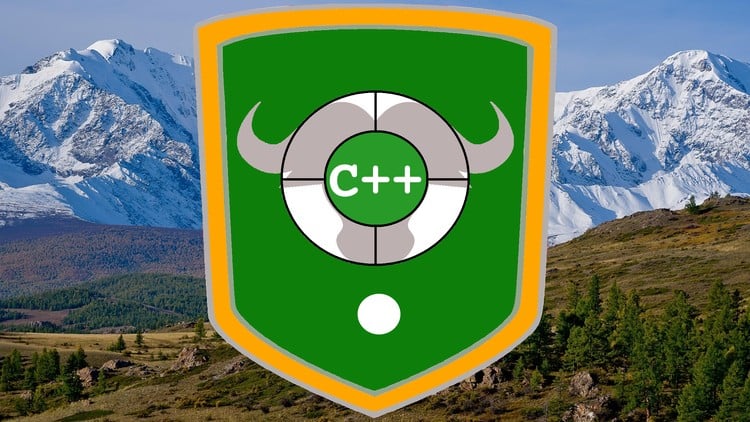
Exploring the C/C++ Commons
⏱️ Length: 9.1 total hours
⭐ 3.91/5 rating
👥 4,879 students
🔄 July 2023 update
Add-On Information:
Note➛ Make sure your 𝐔𝐝𝐞𝐦𝐲 cart has only this course you're going to enroll it now, Remove all other courses from the 𝐔𝐝𝐞𝐦𝐲 cart before Enrolling!
- Course Overview
- This ‘C/C++ 1000’ course offers a foundational and comprehensive introduction to C and C++ programming, designed for absolute beginners.
- Explore core procedural and introductory object-oriented programming concepts as implemented in C and C++, understanding their power.
- Master essential syntax, semantics, and core language features for writing efficient and robust software, translating logic into executable code.
- The curriculum emphasizes practical application, guiding you through setting up a powerful, cross-platform development environment using open-source tools.
- Demystify the GNU toolchain, a critical suite for compiling, linking, and debugging C/C++ projects across Linux, macOS, and Windows via Cygwin.
- Grasp crucial memory management concepts like stack, heap, and foundational pointer usage, essential for performant and bug-free C/C++ applications.
- Discover the “C/C++ Commons,” encompassing standard libraries, common idioms, and best practices shared across the global developer community.
- Updated in July 2023, the course content ensures alignment with contemporary C/C++ standards and modern development practices, guaranteeing relevance.
- Cultivate a strong problem-solving mindset, learning to analyze challenges and implement effective algorithmic solutions using C/C++.
- Requirements / Prerequisites
- No prior programming experience in C, C++, or any other language is necessary; the course starts from scratch.
- Basic computer literacy, including file system navigation and common software operation, is beneficial.
- A stable internet connection is essential for accessing course materials, software downloads, and online support.
- Access to a personal computer running Microsoft Windows (with Cygwin), Linux, or macOS is required for practical exercises.
- A genuine eagerness to learn and a persistent attitude towards problem-solving are your most valuable assets for success.
- Familiarity with command-line interfaces is advantageous but not strictly required, as the course will guide you.
- A modern text editor or lightweight IDE (e.g., VS Code) is recommended for writing and managing source code.
- A minimum of 4GB RAM is advised for optimal performance of your development environment.
- Skills Covered / Tools Used
- Core Language Constructs: Implement variables, basic data types, arithmetic operators, and fundamental expressions.
- Conditional Logic: Utilize
if,else if,else, andswitchstatements to control program flow. - Looping Structures: Apply
for,while, anddo-whileloops for repetitive tasks and efficient data processing. - Modular Programming with Functions: Design and define functions to organize code, manage scope, and promote reusability.
- Pointers and References: Understand pointer arithmetic, dereferencing, and their role in direct memory interaction.
- Array Management: Effectively declare, initialize, and manipulate one-dimensional and multi-dimensional arrays.
- Character Arrays and Strings: Work with C-style character arrays and understand the C++
std::stringclass. - Basic File I/O: Perform operations to read from and write to text files, enabling data persistence.
- Error Handling: Implement basic error checking using return codes and introduce C++ exceptions.
- GNU GCC/G++ Compilation: Compile C and C++ source files from the command line using various flags.
- GNU Debugger (GDB) Proficiency: Learn to set breakpoints, step through code, inspect variables, and analyze call stacks with GDB.
- Makefile Automation: Create and manage Makefiles to automate the build process for multi-file projects.
- Preprocessor Directives: Apply directives like
#include,#define, and conditional compilation. - Standard Library Essentials: Utilize fundamental components from C/C++ Standard Libraries, including I/O streams and basic containers.
- Code Organization: Implement strategies for structuring projects using separate header and source files.
- Command-Line Interface Interaction: Develop comfort and proficiency in interacting with your development environment via the command line.
- Interpreting Compiler Messages: Master deciphering and resolving compiler warnings and errors, a crucial debugging skill.
- Introductory Object-Oriented Programming: Grasp basic concepts of classes, objects, and encapsulation in C++.
- Type Casting: Understand explicit and implicit type conversions for data integrity.
- Benefits / Outcomes
- Attain a strong, fundamental mastery of C and C++, providing a solid programming foundation for future advanced studies.
- Confidently set up and manage your C/C++ development environment across various OS using powerful GNU tools.
- Sharpen your problem-solving and algorithmic thinking abilities, skills universally valued across all programming domains.
- Gain practical experience across the entire C/C++ development pipeline, from coding and compilation to debugging.
- Be well-prepared to engage with and contribute to open-source projects, which frequently leverage C/C++ and the GNU toolchain.
- Establish a robust groundwork for deeper dives into specialized C++ areas like systems programming or game development.
- Enhance your understanding of how software interacts with hardware, fostering appreciation for system architecture.
- Acquire highly marketable skills relevant to high-performance computing and critical infrastructure development.
- Develop the capability to effectively read, comprehend, and modify existing C/C++ codebases for collaborative work.
- Cultivate best coding practices, including writing clean, well-documented, and maintainable C/C++ code.
- Achieve a profound understanding of compilation and linking processes, beyond simply running code.
- PROS
- Beginner-Friendly: Excellently designed for absolute novices, making C/C++ accessible without prior coding knowledge.
- GNU Toolchain Mastery: Focuses on industry-standard GNU tools (GCC, GDB, Make), providing practical, job-ready skills.
- Cross-Platform Support: Offers flexibility to develop on Windows (Cygwin), Linux, and macOS for diverse users.
- Hands-On Learning: Emphasizes practical exercises and real-world examples for immediate skill application.
- Up-to-Date Content: Updated in July 2023, ensuring relevance with modern C/C++ practices and standards.
- Solid Foundation: Provides an exceptional base for pursuing advanced C/C++ topics and specialized career paths.
- CONS
- The inherent complexity of C/C++ combined with the course’s command-line GNU tools focus may pose a significant initial challenge for absolute beginners, requiring substantial dedication.
Learning Tracks: English,Development,Programming Languages
Found It Free? Share It Fast!